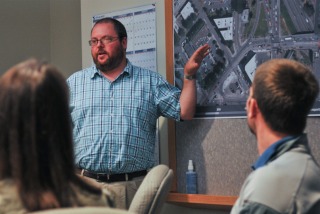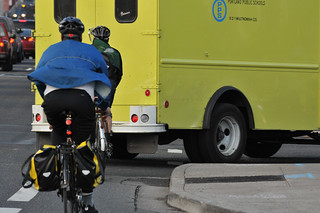
(Photos © J. Maus/BikePortland)
The Portland Bureau of Transportation (PBOT) has announced plans to close auto access on N Wheeler Avenue where it intersects with Broadway. The surprise announcement — nothing short of a bold attempt to prevent right-hook collisions — was made at a special meeting of neighborhood reps, ODOT, and other stakeholders at the City of Portland building earlier today. The meeting was called to discuss “immediate” steps to improve what PBOT (and many others) see as an urgent safety issue: Right-hook collisions at N. Broadway and Wheeler.
“[A partial or full closure of Wheeler] was only solution we see that eliminates substantially the right-hook conflict existing in this location that we think is very likely to cause a serious injury or death.”
— Greg Raisman, PBOT
PBOT traffic safety project expert Greg Raisman led the meeting. He spoke with urgency. “Unfortunately,” he said at the meeting’s outset, “our efforts to date have not addressed the concerns to a level where it’s no longer a critical safety problem. It remains a critical safety problem that we’re focused on addressing in an immediate way.”
To further frame the issue, Raisman said analysis of the collision history at Broadway/Flint/Wheeler showed that in recent years it has never fallen out of the top five (and is often number one) in terms of reported bicycle/motor-vehicle collisions in the entire city (out of 22,000 total intersections). Raisman then detailed the perfect storm of factors that make this intersection unsafe: complicated geometries, high speeds, illegal riding and driving behaviors, non-standard turning movements, poor visibility, and so on.
Raisman said he and PBOT staff reviewed every recorded collision from the DMV and the Police between 2000 and 2010 and there were 20 serious bike/motor-vehicle collisions. 17 of those 20 were right hooks at Wheeler.
“There are a lot of safety issues in the area,” Raisman continued, “We have some other needs, but in terms of the one that is the most consistent crash type where we have the most significant concern that we’re going to see a serious tragedy is at Broadway and Wheeler; which is why we’re focused on providing an immediate, near and long-term strategy to address it.”
Raisman’s emphatic talk about the intersection is backed up by many factors beyond just collision data. The Portland Water Bureau was so concerned about the potential of bike/truck collisions that they’ve prohibited employees from driving on Wheeler since 2007. Today we learned that another business located near Wheeler, North Coast Electric, will also tell employees to not drive on the street due to safety concerns. Broadway/Wheeler/Flint has a very public record of bike collisions and it also has had years of effective citizen activism on the part of Besty Reese, co-owner of the Paramount Apartments (located on the peninsula formed by Broadway/Flint/Wheeler). Reese was at the meeting today.

Also at the meeting were a BTA volunteer, a man who owns a manufacturing business in the lower Albina area (which is accessed via Wheeler) and reps from the Boise-Eliot Neighborhood Association, the Rose Garden Arena, the Oregon Department of Transportation (ODOT), the Lloyd TMA, the Portland Water Bureau, the Portland Bicycle Advisory Committee, and more.
Hanging over talks of immediate fixes, and making potential solutions even more complicated (both in terms of infrastructure decisions and politics), is the major N/NE Quadrant and I-5 Broadway/Weidler plans. As part of that process, the City of Portland and ODOT have drafted a new, $400 million facility plan that will add a lane to the I-5 freeway through the corridor and make surface street improvements. While ODOT has agreed to fasttrack some elements of that plan to improve Broadway/Flint/Wheeler issues, it was made clear today that all of them (removal of I-5 slip ramp, a new signal on Broadway at Wheeler) are at least several years and millions of dollars away.
Even with those plans in place, there’s been a growing sense that a fix to Broadway/Flint/Wheeler is too important to wait the many years before implementation. As collisions continue to occur and people continued to be harmed, the pressure for PBOT to do something has become too much to ignore.
Today, we learned that PBOT will step up and do the most obvious, low-cost, and effective thing to prevent right hooks: Close Wheeler to auto access. Back in June, frustrated by yet another person who had been injured at the intersection, I suggested at least closing Wheeler to right turns (northbound) from Broadway. Today, Raisman said they were convinced some sort of closure — either partial or full — is the only option that will work immediately.

“[A partial or full closure of Wheeler] was only solution we see,” said Raisman, “that eliminates substantially the right-hook conflict existing in this location that we think is very likely to cause a serious injury or death.”
PBOT says they could put construction barricades up right away and would also widen curbs on the northwest and southwest corners of Wheeler/Broadway to discourage people from continuing to enter Wheeler from Broadway.
“Wheeler is one of only two access points for these businesses… And as much as every player down there prefers safety to non-safety, this is an important access route both from a productivity/travel-time point of view and from an emergency egress point of view too.”
— Eric Lovell, owner of Uroboros Glass
While many people at today’s meeting thanked PBOT for this decision and urged them to put up the barricades immediately, there are a few more conversations PBOT will have with nearby businesses before implementing the changes.
At the outset of today’s meeting, Eric Lovell, who has owned Uroboros Glass since 1984, expressed concerns about any reduction of access on Wheeler. Representing himself and other businesses in the Lower Albina area, he said, “I want to protect their access to their neighborhood.” “Wheeler is one of only two access points for these businesses,” he said, “And as much as every player down there prefers safety to non-safety, this is an important access route both from a productivity/travel-time point of view and from an emergency egress point of view too.”
Upon hearing PBOT’s plan, Heather McCarey (representing the City’s Bicycle Advisory Committee) turned to Lovell and asked, “Can this [closure plan] be an immediate solution to saving a life?”
Lovell responded by saying, “It’s pretty easy to see that closing Wheeler will prevent the accidents and it’s cheap, so it’s hard to take any position against that.” While he seems to accept the idea, Lovell made it clear that any closure (partial or full) would be a sacrifice for the businesses and he wants help with other issues in exchange for his support. “Let’s tie this in with some efforts to improve things for those manufacturing businesses in lower Albina,” he said, “These are the ones that haven’t gone to Hillsboro or Vancouver and it’s getting harder to do business down there all the time.” (Please note that Mr. Lovell was very reasonable and open-minded. I believe his heart is in the right place and that he will work for a good outcome.)
Interestingly, although she’s passionate about the safety concerns, Paramount Apartments owner Betsy Reese has opposed past suggestions to limit motor vehicle access to Wheeler. She’s concerned that the main entrance to her historic building would no longer be easily accessible to tenants and guests who arrive by car. But today, she surprised everyone by opposing the partial closure on the grounds that it wasn’t going far enough. “This is a half-measure,” Reese said, “I want a full closure of Wheeler.” Instead of a partial closure, which she described as a “significant concession for Paramount,” Reese would rather have a full closure so she can plan a “quiet cul-de-sac” and a “lovely spot” in front of her building. “Don’t jump across that chasm in two small hops,” she said, “Do it one big leap and close it this afternoon!”
Raisman initially said they would implement a closure following a September 6th meeting with the Water Bureau and other businesses and stakeholders in the lower Albina; but after hearing cries for quick action from stakeholders today, he was willing to change those plans and consider implementing either a partial or full closure even sooner than that.
Justin Zuelner, the Director of Sustainability and Planning for the Portland Trail Blazers and the Rose Garden Arena, said he wants action right away. “We feel almost a sense of guilt, and even potential liability because we’ve all sat in rooms and said this is something we need to address and yet we have not addressed it. If this is the immediate mitigation, I hope to see it today, because if it’s that great of a concern — and I agree with you that it is — we can’t stop short and wait until tomorrow because somebody could get killed today.”
—
Please note: This is a fluid situation and PBOT is actively having conversations with stakeholders about the best way to implement a closure. Whatever type of closure happens (and I feel confident saying some sort of closure is guaranteed), you can bet PBOT will continue to test how it works (or doesn’t) and they will be able to change course if necessary. Stay tuned for further developments.


